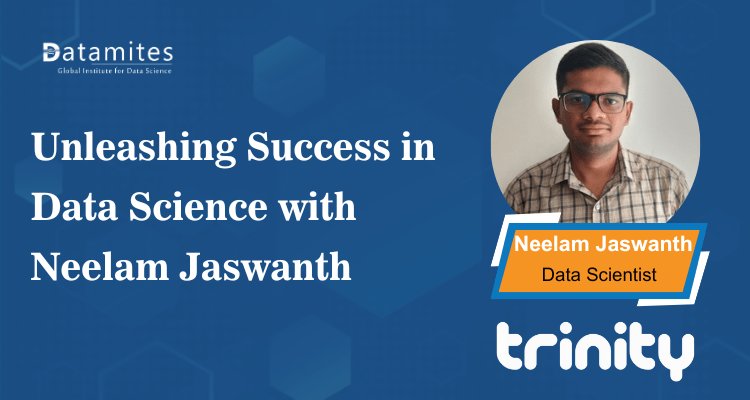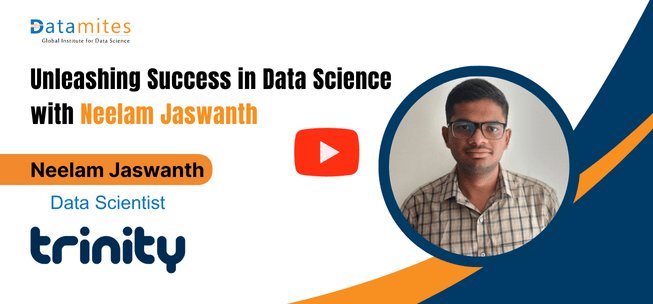Neelam Jaswanth’s Journey to Success in Data Science
Discover how Neelam Jaswanth transformed her career through dedication and data-driven learning. From a non-tech background to landing a top role in data science, her story is truly inspiring. Learn the key steps, challenges, and tools she used along the way. A must-read for anyone aspiring to enter the world of data science!

The world of data science continues to expand, offering exciting career opportunities for individuals from diverse backgrounds. But the path isn't always straightforward, especially for those transitioning from non-tech fields. How does one navigate the learning curve, tackle interviews, and ultimately land a coveted data scientist role?
Today, we explore the inspiring journey of Neelam Jaswanth, a DataMites alumnus who transitioned from Civil Engineering to a Data Scientist role at Trinity Mobility. Neelam shares his experiences, challenges, learning strategies, and valuable insights for aspiring data scientists.
His story is a testament to the fact that with dedication, the right guidance, and consistent effort, breaking into the data science field is achievable, even without a traditional computer science background. Let's explore his path, learn from his insights, and get answers to crucial questions about making this career switch.
Neelam Jaswanth’s Journey to Data Scientist with DataMites
Discover how Neelam Jaswanth transitioned from a fresher to a Data Scientist with the right training, persistence, and industry exposure
Q1: What was your educational background before getting into data science?
I completed my B.Tech in Civil Engineering from Sri Venkateswara University College of Engineering, Tirupati. I had an academic background in basic statistics, but programming knowledge was minimal.
Q2: When did you decide to transition into data science?
In my final year of B.Tech (September-November 2021), I started exploring career options. After researching industry trends, I realized that data science is a booming industry with a promising future, which led me to pursue it seriously.
Q3: How did you choose DataMites for your learning journey?
I researched multiple training institutes, checked reviews, and chose DataMites Institute because of its structured curriculum, expert mentors, and positive student feedback. I joined in November 2022.
Q4: How long did it take for you to complete the course and land a job?
It took me around 10 months to complete the course, internship, and job preparation before securing a data scientist role in July 2023.
Q5: What was your level of knowledge in programming before joining DataMites?
I had basic knowledge of Python and some understanding of statistics from my B.Tech curriculum. However, I needed structured learning to apply these concepts effectively.
Q6: What was your learning experience at DataMites like?
The course structure was well-organized. My mentor made learning Python and statistics easy and interactive. The real challenge was in practicing consistently, as data science requires hands-on learning rather than passive study.
Q7: How many hours did you practice daily?
There was no fixed consistency, but I aimed for 2-3 hours of practice daily after class. The key takeaway was that practice is more important than just watching lectures.
Q8: How should beginners approach learning Python?
For absolute beginners, Python can take around 1 month to learn for data science applications. The learning pace depends on how much effort you put in daily. Regular practice is crucial.
Q9: How was your experience learning statistics for data science?
Initially, statistics felt like pure theory and was difficult to grasp. However, when I started relating it to machine learning concepts, it became easier to understand. Machine learning is deeply rooted in statistics, and once I made that connection, the concepts became much clearer.
Q10: How long did it take to learn machine learning and deep learning?
It took around five weeks to learn Machine Learning and approximately three weeks to grasp Deep Learning concepts. In total, the entire Data Science learning journey, including Machine Learning, Deep Learning, and other essential skills, spanned approximately three to four months.
Q11: How important is practice in data science?
The more you practice, the more comfortable you become with data science. My seniors in my company advised me that 50 minutes of learning should be followed by at least 1 hour of practice.
Q12: What kind of projects did you work on during your internship?
I completed two capstone projects and two personal projects:
Capstone Projects:
- Customer Transaction Prediction (Regression-based project)
- Heart Disease Prediction (Deep Learning-based project)
- Automobile Price Prediction
Personal Projects:
- Text Summarization using Google's Pegasus Transformer
- Text Classification using LLM (Large Language Model)
Q13: How many interviews did you attend before getting selected?
I attended two interviews. I failed the first but learned from it, revised my concepts, and cleared the second interview with Trinity Mobility.
Q14: What mistakes did you make in your first interview?
The first interview tested Python (OOPs concepts) and SQL (Joins, Window Functions). I lacked confidence in OOPs concepts, which led to my failure. After revising these topics, I successfully cleared my next interview.
Q15: What questions were asked in your final interview?
My interview at Trinity Mobility focused on:
- Regression models and evaluation metrics
- Classification models and performance measures
- Basic understanding of time series models
- Machine learning concepts (but no coding was required)
Q16: Do companies expect candidates to write ML code in interviews?
Not really. Nowadays, large language models (like ChatGPT) assist in coding, so companies focus more on understanding concepts rather than writing raw code from scratch.
Q17: How important are Large Language Models (LLMs) in the tech industry today?
AI tools like ChatGPT are widely used in the industry. Many professionals use them to improve coding efficiency, write optimized and bug-free code, and automate tasks. Knowing how to leverage LLMs increases productivity.
Q18: What materials did you follow for learning and interview preparation?
DataMites course materials
- Krish Naik’s YouTube tutorials on Machine Learning
- Siddhardhan’s ML videos
- Class notes and hands-on practice with real datasets
Q19: What is your advice for aspiring data scientists?
- Be consistent – Regular learning and practice are key.
- Don’t memorize, understand concepts – Especially statistics and ML algorithms.
- Work on projects – Real-world projects improve confidence.
- Practice SQL and Python – They are essential in interviews.
- Leverage AI tools (like ChatGPT) – They boost efficiency.
Q20: What was your salary package as a fresher data scientist?
My package is in the range of 4 to 6 LPA, which is a great start. Your growth depends on how much value you bring to the company.
Refer these articles:
- First Steps in Data Science: Shreenidhi’s Journey to Success
- From Passion to Profession: Sweta Rai’s Inspiring Data Science Journey
Insights from Neelam Jaswanth’s Data Science Success Story
Neelam Jaswanth’s Data Science success story is an inspiring example of how dedication, strategic learning, and persistence can lead to a thriving career in tech. Here are some key insights from her journey:
- Background is Not a Barrier: Transitioning from fields like Civil Engineering is possible with focused effort.
- Practice is Paramount: Theoretical knowledge must be complemented by extensive hands-on practice. Aim for more practice time than learning time.
- Fundamentals First: A strong grasp of Python, SQL, Statistics, and core ML concepts is non-negotiable for interviews.
- Projects Matter: Build a portfolio, including personal projects using relevant technologies (like NLP/LLMs), to demonstrate initiative and practical skills.
- Embrace Learning Tools: Utilize resources like YouTube channels (Krish Naik, etc.) and leverage tools like ChatGPT effectively for coding productivity, while ensuring conceptual understanding.
- Learn from Failure: Interview rejections are learning opportunities. Identify weaknesses and work on them.
- Consistency and Patience: The journey takes time (around 10 months for Neelam). Stay consistent with learning and be patient through the process.
- Continuous Learning: Data science is dynamic. Be prepared to continuously learn and upgrade your skills even after landing a job.
- Leverage Structured Training: A good training program (like Datamites) provides curriculum, mentorship, mock interviews, and placement assistance, streamlining the process.
Neelam Jaswanth's story vividly illustrates that the path to becoming a data scientist is paved with dedication, strategic learning, practical application, and resilience. His transition from Civil Engineering in under a year underscores the effectiveness of structured training programs like Datamites and the power of consistent personal effort.
Refer these articles:
- Why Data Scientist Career in Hyderabad
- Why Data Scientist Career in Chennai
- Why Data Scientist Career in Bangalore
His emphasis on practice over passive learning, the importance of mastering fundamentals, and the courage to learn from initial setbacks are crucial lessons for anyone aspiring to enter this field. As Neelam aptly put it, "Consistency, patience, continuous learning is important for the data science field," adding humorously that distractions should be treated "like an outlier, not as a whole data!"
If you're contemplating a career shift into data science, now is an excellent time to enhance your skills. According to a 2024 report by IMARC Group, the global data science platform market reached USD 15.2 billion in 2024 and is projected to grow at a compound annual growth rate (CAGR) of 27.08%, reaching USD 144.9 billion by 2033. To remain competitive in this rapidly expanding field, it's essential to select an institute that offers practical training, internships, and placement support. Enroll in top data science courses in Chennai, Bangalore, Hyderabad, Pune, Mumbai, Delhi, and Ahmedabad to successfully kickstart your career.
DataMites Institute is a leading training provider specializing in Data Science, AI, Machine Learning, Python Development, and Data Analytics. Accredited by IABAC and NASSCOM FutureSkills, DataMites offers expert-led training, real-world projects, and extensive placement support, helping learners transition smoothly into data science careers.
With offline data science institute in Bangalore, Hyderabad, Chennai, Pune, Ahmedabad, Coimbatore, and Mumbai, along with online learning options, DataMites ensures practical experience and industry-relevant skills for students and professionals. Whether you're a fresh graduate, a working professional, or looking for a career shift, DataMites provides a structured and effective pathway into Data Science, AI, and Machine Learning.

